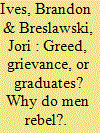| Srl | Item |
| 1 |
ID:
183025


|
|
|
|
|
| Summary/Abstract |
What leads some rebel groups to remain cohesive, while others fragment into multiple rebel groups? A growing literature examines the causes behind fragmented non-state actors and movements. Building on this work, this article examines the relationship between a rebel group and its external supporter and focuses on the extent of ethnic links between the two. It advances a novel argument for why rebel groups that receive external support from non-ethnic supporters are more likely to fragment. Using statistical analysis, I examine the relationship between ethnic and non-ethnic external support and fragmentation from 1975 to 2009. I find that an increasing percentage of co-ethnic external support is negatively associated with rebel group fragmentation. Examining variation in the relationship type that rebel groups and external supporters share provides us a fuller understanding of why some rebel groups remain cohesive and why others fragment.
|
|
|
|
|
|
|
|
|
|
|
|
|
|
|
|
| 2 |
ID:
172332


|
|
|
|
|
| Summary/Abstract |
When do nonviolent protests escalate into violence? Existing literature has focused primarily on campaign-level escalations and only recently has work begun to examine protest event-level escalations. We build on this emerging literature and develop an argument for why some protests escalate to violence. We use statistical analysis and find that violent escalations are more likely to occur following recent repression and when protests are unorganized. Our results offer insight into the conditions in which protests remain peaceful and offer citizens a channel to pursue their goals as well as the conditions in which protests become violent and destabilizing.
|
|
|
|
|
|
|
|
|
|
|
|
|
|
|
|
| 3 |
ID:
185186


|
|
|
|
|
| Summary/Abstract |
Education is widely known for its positive effect on conventional politics and nonviolent protest as well as its suppressive effect on violence. However, recent studies have connected education to violence through its effect on relative deprivation and frustration–aggression mechanisms. We address these divergent findings by presenting a theory of the conditional effect that education has on violence. To do so, we build on literature addressing education’s positive association with political participation, such as voting and protests, and question how this relationship translates to contexts in which conventional and nonviolent channels are unlikely to be effective – specifically, in cases of politically excluded ethnic groups. We argue that education increases ethnic group members’ resources and desire to address grievances. Yet, because the ethnic group is politically excluded, opportunities for conventional politics and nonviolent protest are limited. Educated ethnic group members are limited in political options, and are thus more likely to address their grievances through the support of rebel groups, increasing the probability of violence. Violence then occurs in localities where members of a politically excluded ethnic group are located and where those members have higher levels of education. Using geo-spatial data and statistical analysis, we demonstrate that education has divergent effects on violence in areas populated by politically excluded versus politically included ethnic groups in Africa and Central America. Areas with highly educated politically excluded ethnic group members are the most likely to experience violent events.
|
|
|
|
|
|
|
|
|
|
|
|
|
|
|
|